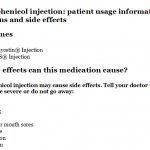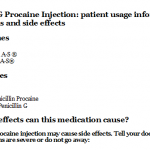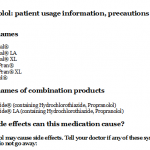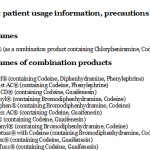
Rilpivirine: patient usage information, precautions and side effects
Tuesday, May 30, 2017 by Gregory Van Dyke
http://www.naturalnewsreference.com/2017-05-30-rilpivirine-patient-usage-information-precautions-and-side-effects.html
Rilpivirine: patient usage information, precautions and side effects
Brand names
Edurant®
What side effects can this medication cause?
Rilpivirine may cause side effects. Tell your doctor if any of these symptoms are severe or do not go away:
-
difficulty falling asleep or staying asleep
-
headache
-
rash
Some side effects can be serious. If you experience any of the symptoms listed in the SPECIAL PRECAUTIONS section, call your doctor immediately.
Rilpivirine may cause other side effects. Call your doctor if you have any unusual problems while taking this medication.
If you experience a serious side effect, you or your doctor may send a report to the Food and Drug Administration’s (FDA) MedWatch Adverse Event Reporting program online (http://www.fda.gov/Safety/MedWatch) or by phone (1-800-332-1088).
Why is this medication prescribed?
Rilpivirine is used along with other medications to treat human immunodeficiency virus infection (HIV). Rilpivirine is in a class of medications called non-nucleoside reverse transcriptase inhibitors (NNRTIs). It works by decreasing the amount of HIV in the blood. Although rilpivirine does not cure HIV, it may decrease your chance of developing acquired immunodeficiency syndrome (AIDS) and HIV-related illnesses such as serious infections or cancer. Taking these medications along with practicing safer sex and making other life-style changes may decrease the risk of transmitting (spreading) the HIV virus to other people.
How should this medicine be used?
Rilpivirine comes as a tablet to take by mouth. It is usually taken with a meal (not just a protein drink) once a day. Take rilpivirine at around the same time every day. Follow the directions on your prescription label carefully, and ask your doctor or pharmacist to explain any part you do not understand. Take rilpivirine exactly as directed. Do not take more or less of it or take it more often than prescribed by your doctor.
Rilpivirine controls HIV but does not cure it. Continue to take rilpivirine even if you feel well. Do not stop taking rilpivirine without talking to your doctor. When your supply of rilpivirine starts to run low, get more from your doctor or pharmacist. If you miss doses or stop taking rilpivirine, your condition may become more difficult to treat.
Ask your pharmacist or doctor for a copy of the manufacturer’s information for the patient.
Other uses for this medicine
This medication may be prescribed for other uses; ask your doctor or pharmacist for more information.
What special precautions should I follow?
Before taking rilpivirine,
-
tell your doctor and pharmacist if you are allergic to rilpivirine, any other medications, or any of the ingredients in rilpivirine tablets. Ask your pharmacist for a list of the ingredients.
-
tell your doctor if you are taking dexamethasone (Decadron); medications for seizures including carbamazepine (Carbatrol, Epitol, Euetro, Tegretol, Teril), oxcarbazepine (Trileptal), phenobarbital (Luminal), or phenytoin (Dilantin, Phenytek); proton pump inhibitors including esomeprazole (Nexium, Vimovo), lansoprazole (Prevacid), omeprazole (Prilosec), pantoprazole (Protonix), or rabeprazole (Aciphex); rifampin (Rifater, Rifamate, Rimactane, Rifadin); rifapentine (Priftin); ritonavir (Norvir); and St. John’s wort. Your doctor will probably tell you not to take rilpivirine if you are taking one or more of these medications.
-
tell your doctor and pharmacist what other prescription and nonprescription medications, vitamins, nutritional supplements, and herbal products you are taking or plan to take. Be sure to mention any of the following: antifungal medications, including fluconazole (Diflucan), itraconazole (Sporanox), ketoconazole (Nizoral), posaconazole (Noxafil), and voriconazole (Vfend); arsenic trioxide (Trisenox);cisapride; clarithromycin (Biaxin); domperidone (Motilium, not available in the U.S.); erythromycin (E-Mycin, Eryc, Ery-Tab, PCE, Pediazole); medications to treat angina and irregular heart rhythms; medications to treat malaria; medications to treat mental illness or Tourette’s syndrome; medications to treat pain; methadone (Dolophine); moxifloxacin (Velox); other medications to treat HIV/AIDS; pentamidine (NebuPent, Pentam); probucol (Lorelco, not available in the U.S.); rifabutin (Mycobutin); sparfloxacin (Zagam, not available in the U.S.); telithromycin (Ketek); terfenadine (Seldane, not available in the U.S.); troleandomycin (TAO); and vandetanib (Zactima). Your doctor may need to change the doses of your medications or monitor you carefully for side effects.
-
if you are taking antacids, take them at least 2 hours before or 4 hours after rilpivirine.
-
if you are taking a medication for indigestion, heartburn, or ulcers such as cimetidine (Tagamet), famotidine (Pepcid), nizatidine (Axid), or ranitidine (Zantac), take it at least 12 hours before or at least 4 hours after rilpivirine.
-
if you are taking didanosine (Videx), take it at least two hours before or at least four hours after rilpivirine.
-
tell your doctor if you have or have ever had depression or other mental illness, liver disease, including hepatitis B or C, or kidney disease.
-
tell your doctor if you are pregnant or plan to become pregnant. If you become pregnant while taking rilpivirine, call your doctor. Tell your doctor if you are breast-feeding. You should not breast-feed if you are infected with HIV or if you are taking rilpivirine.
-
if you are having surgery, including dental surgery, tell the doctor or dentist that you are taking rilpivirine.
-
you should know that your body fat may increase or move to different areas of your body such as your breasts, upper back and neck, or around the middle of your body. Loss of fat from the legs, arms, and face can also happen.
-
you should know that rilpivirine may cause changes in your thoughts, behavior, or mental health. Call your doctor immediately if you develop any of the following symptoms while you are taking rilpivirine: new or worsening depression; feeling sad, hopeless, anxious, or restless; or thinking about killing yourself or planning or trying to do so. Be sure your family knows which symptoms may be serious so that they can call your doctor if you are unable to seek treatment on your own.
-
you should know that while you are taking medications to treat HIV infection, your immune system may get stronger and begin to fight other infections that were already in your body. This may cause you to develop symptoms of those infections. If you have new or worsening symptoms after starting treatment with rilpivirine, be sure to tell your doctor.
What special dietary instructions should I follow?
Unless your doctor tells you otherwise, continue your normal diet.
What should I do if I forget a dose?
Take the missed dose as soon as you remember it. However, if it has been more than 12 hours since your last dose, skip the missed dose and continue your regular dosing schedule. Do not take a double dose to make up for a missed one.
What should I know about storage and disposal of this medication?
Keep this medication in the container it came in, tightly closed, and out of reach of children. Store it at room temperature and away from light, excess heat and moisture (not in the bathroom).
Unneeded medications should be disposed of in special ways to ensure that pets, children, and other people cannot consume them. However, you should not flush this medication down the toilet. Instead, the best way to dispose of your medication is through a medicine take-back program. Talk to your pharmacist or contact your local garbage/recycling department to learn about take-back programs in your community. See the FDA’s Safe Disposal of Medicines website (http://goo.gl/c4Rm4p) for more information if you do not have access to a take-back program.
In case of emergency/overdose
In case of overdose, call your local poison control center at 1-800-222-1222. If the victim has collapsed or is not breathing, call local emergency services at 911.
What other information should I know?
Keep all appointments with your doctor and the laboratory. Your doctor will order certain lab tests to check your body’s response to rilpivirine.
Do not let anyone else take your medication. Ask your pharmacist any questions you have about refilling your prescription.
It is important for you to keep a written list of all of the prescription and nonprescription (over-the-counter) medicines you are taking, as well as any products such as vitamins, minerals, or other dietary supplements. You should bring this list with you each time you visit a doctor or if you are admitted to a hospital. It is also important information to carry with you in case of emergencies.
Why is this medication prescribed?
How should this medicine be used?
What special precautions should I follow?
What special dietary instructions should I follow?
What should I do if I forget a dose?
What side effects can this medication cause?
What should I know about storage and disposal of this medication?
Tagged Under: Tags: chemical medicine, medication, Pharma, Prescription Medicine





